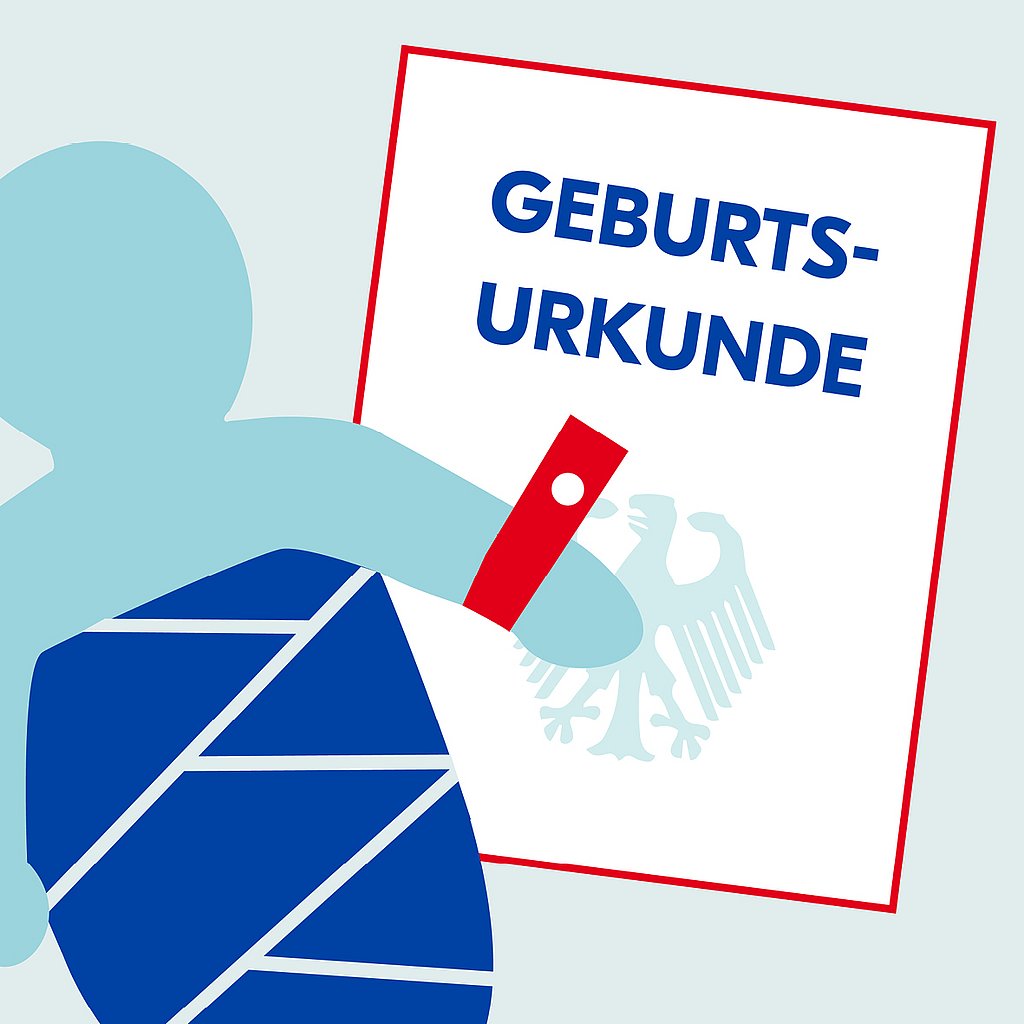"Everything is attached to the birth certificate. Whether the child gets a health insurance card, whether you can apply for child benefit and all that stuff, you need the birth certificate for that." (Int. 420 baby helper from Berlin birth clinic).
The grueling path to a birth certificate for refugee families.
At first, the issuance of a birth certificate sounds like a self-evident formality that all parents and families - whether refugees or not - are entitled to after the birth of their child. However, in the case of refugee families, it is characterized by a long often grueling path due to bureaucratic burden resulting from high requirements for documents to be presented.
Gateway function of the birth certificate
The importance of the birth certificate lies in its gateway function - after all, it is a prerequisite for numerous existentially necessary services. It proves that a person exists and thus has access to civil rights, privileges and duties. It is a necessary document for health insurance and thus for billable examinations of the newborn, or the payment of child benefits. In Germany, the UN Convention on the Rights of the Child is applicable law, according to which every child „must be entered in a register immediately after birth“ (Gerbig 2018:1). Thus, the right to non-discrimination of children against a worse positioning due to an unclear identity of their parents must be protected (Gerbig 2018). If papers are missing, a certified extract from the birth register must be provided, which is considered equivalent to the birth certificate and sufficient for medical or government benefits. However, this is a minimum obligation and a transitional solution, as it does not conclude the procedure under civil status law. For non-discriminatory access to birth certificates, the timely issuance of the certificate and the assumption of costs for certified official translations are necessary.
Results from the PROREF Study
33 refugee mothers from 19 countries of origin living in Germany 1-9 months after the birth of the child as well as 80 professionals (social workers, midwives, doctors) were interviewed qualitatively about medical and social care. Non-discriminatory issuance of the birth certificate was present in only a few cases, preventing social participation of refugee families in health care, education and social services. In the present study, non-issuance of birth certificates primarily affected parents without passports and their own birth certificates or religiously married parents (e.g., Muslim or Yezidi). Illiterate women had additional difficulties in meeting the high demands of the registry office.
The following consequences were evident for families due to the lack of birth certificates:
- Waiting and uncertainty, psychological stress for mothers in the postpartum period.
- Lack of health insurance and medical care for the newborn child
- Financial disadvantages (child benefit, job center, foundation applications, translation costs, medical care)
- Lack of participation (daycare vouchers, school attendance)
- Resignation (children who remain undocumented in the long term)
- Refugee families denied information and legal rights
Conclusion
The results of the study indicate that German personal status law is in conflict with the best interests of the child. According to UN children's rights, no child should experience disadvantages due to lack of parental requirements. However, by not issuing birth certificates and extracts from the birth register, social affiliations are established, legitimized and reproduced. People are categorized and hierarchically structured from the beginning of their lives. In the long term, this cements processes of exclusion and experiences of helplessness in the areas of education, health and financial justice. From the point of view of this study, the exclusion of children from education and health care can be classified as a threat to children's well-being. Precariousness and poverty risk of families should be prevented by the involvement of registry offices and other authorities.
Responsibility of social work
If social work wants to see itself as a human rights profession, knowledge about the complexity and importance of the topic of birth certificates in the context of migration/refugee are of great practical relevance. It is often social workers who are at the interface between the interests of refugee families and registry offices and other authorities and who can help to facilitate the issuance of birth certificates. It is therefore important for social workers to understand the structural dependence of health care and social support on regulations of the asylum system. Knowledge gaps regarding the legal situation and entitlements should be closed through targeted information in order to enable social participation for refugee families and their children in practice.
Further reading: Engelhardt, M, Gaudion, M, Kamhiye, J, Al-Munjid, R, Borde, T. (in press) Legalisiertes Othering bei der (Nicht-)Ausstellung von Geburtsurkunden geflüchteter Kinder. Migration und Soziale Arbeit. Issue 4/2022. Martha Engelhardt (Psychologist M.Sc.) is a research associate in the Pregnancy and Obstetric Care for Refugees (PROREF) project, engelhardt@ ash-berlin.eu



